Halfway through the year, and that darned pandemic just keeps throwing us curve-balls, doesn’t it? I hope – wherever you are – you are trucking ok. How great that we are all readers, that we have something to take us away to other lives and worlds whenever we feel like it. And, it looks like many of our participants are doing just that.
As usual, awards announcements made over the last month are at the end of the post.
Joyous June
Actually. I don’t think June was particularly joyous – lockdowns in Melbourne, lockdowns in Sydney, and various border closures, topped off by cold weather – but calling it so, helps! June’s figure of 41 reviews is the same as June 2020’s, and 7 less than last month’s. These reviews were for 33 different books.
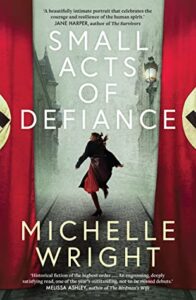 Most reviewed authors and books: Michelle Wright’s Small acts of defiance had two reviews and an interview posted in July. This link will take you to all posts submitted to the Challenge for this book. Too many authors to list received two reviews.
Most reviewed authors and books: Michelle Wright’s Small acts of defiance had two reviews and an interview posted in July. This link will take you to all posts submitted to the Challenge for this book. Too many authors to list received two reviews.- Top reviewers: Two GoodReads reviewers – and regulars here – Cass Moriarty with 7 reviews, and Cloggie DownUnder with 6.Thanks to Cassie and Cloggie for their ongoing support of the challenge. Another four participants submitted 3 reviews each.
- Classics: No reviews for classics this month which, coincidentally, happened last June too. Indeed, the oldest book reviewed this month was published in 2005, Heather Rose’s Butterfly man.
Classics
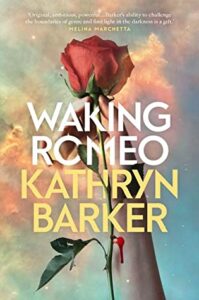 As always, I’m leaving this heading here as a place-holder to remind us all – me, in particular. So, in lieu of reporting on reviews of classics, how about looking at a book that riffs on a classic (albeit not an Australian classic)? The book is Kathryn Barker’s Waking Romeo, so you can guess which classic we are talking about! Reviewer Claire (Claire’s Reads and Reviews) describes it as a time-travel, dystopian and romance novel built on a classic – but wait there’s more! This novel is also an homage to a second classic, Emily Bronte’s Wuthering Heights. Claire says:
As always, I’m leaving this heading here as a place-holder to remind us all – me, in particular. So, in lieu of reporting on reviews of classics, how about looking at a book that riffs on a classic (albeit not an Australian classic)? The book is Kathryn Barker’s Waking Romeo, so you can guess which classic we are talking about! Reviewer Claire (Claire’s Reads and Reviews) describes it as a time-travel, dystopian and romance novel built on a classic – but wait there’s more! This novel is also an homage to a second classic, Emily Bronte’s Wuthering Heights. Claire says:
There is a lot to get your head around in this novel, especially the jumping back and forwards in time, the different timelines and how they play out, the memories and Jules’ story, but if you go in with an open mind then you’ll be in for one hell of a ride.
Books about writing
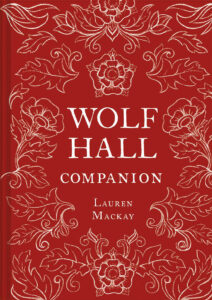 While the Challenge’s “literary” form/subgenre is mainly applied to books that are “literary” in style or quality, it can also be applied to books that are about literature, about writing. Two such books were reviewed this month.
While the Challenge’s “literary” form/subgenre is mainly applied to books that are “literary” in style or quality, it can also be applied to books that are about literature, about writing. Two such books were reviewed this month.
The first one will surprise you, as it did me, as it is the Wolf Hall companion by Lauren Mackay! Wolf Hall, you ask? Yes, because as you’ve probably guessed, the author is Australian, though she now resides in the UK. Reviewer Brona (This Reading Life) says she will be passing on her Wolf Hall trilogy novels, but will be keeping this! The book is comprehensive, providing background both to the period in which the books are set and to Mantel’s evocation of it in her books. To find out all that such a companion includes, read Brona’s review. Her assessment is that it is “Highly recommended for fans of the trilogy and lovers of literary companions.”
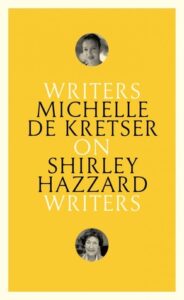 The other book comes from Black Inc’s Writers on writers series, and was also reviewed by Brona! The book is Michelle de Kretzer’s On Shirley Hazzard. Brona has read two from the series, which now comprises 9 books, as have I, and what we’ve noticed is that they vary greatly in how the writer chooses to approach their writer. Brona says about her two: “Earlier on this year, I read Josephine Rowe’s On Beverley Farmer. It was a very literary affair. De Kretser’s book is more conversational and more casual in tone”. The two I’ve read focus particularly on one novel by the writer being written about, but apparently not so Kretser who, writes Brona,
The other book comes from Black Inc’s Writers on writers series, and was also reviewed by Brona! The book is Michelle de Kretzer’s On Shirley Hazzard. Brona has read two from the series, which now comprises 9 books, as have I, and what we’ve noticed is that they vary greatly in how the writer chooses to approach their writer. Brona says about her two: “Earlier on this year, I read Josephine Rowe’s On Beverley Farmer. It was a very literary affair. De Kretser’s book is more conversational and more casual in tone”. The two I’ve read focus particularly on one novel by the writer being written about, but apparently not so Kretser who, writes Brona,
takes time with each of the novels to discuss their themes and her personal reactions, along with various snippets about the writing process and Hazzard’s writing techniques …
I love Hazzard and de Kretser, so this is certainly going on my TBR.
Awards news
Two lesser known Awards announced made announcement in June. Unlike last month there were no overlaps, which is not surprising given one is broadly focused award, and the other a narrowly focused British one.
Colin Roderick Prize longlist (9 of 15 by women)
We may not have always reported on this award that is managed by the Foundation for Australian Literary Studies at James Cook University. Like the Stella prize it is not limited by genre (but unlike the Stella it is for all genders!) It is for “the best book published in Australia which deals with any aspect of Australian life”. The women in the longlist are:
- Stephanie Convery’s After the count: The death of Davey Browne (nonfiction)
- Anna Goldsworthy’s Melting moments (fiction)
- Jane Harper’s The survivors (crime fiction)
- Sofie Laguna’s Infinite splendours (fiction)
- Louise Milligan’s Witness (nonfiction)
- Kirli Saunders Bindi (children’s poetry)
- Nardi Simpson’s Song of the crocodile (fiction)
- Elizabeth Tan’s Smart ovens for lonely people (short stories)
- Jessie Tu’s A lonely girl is a dangerous thing (fiction)
Walter Scott Shortlist
This 2010-established British Literary Award is for historical fiction, named for the “originator” of historical fiction. In 2021, the shortlist of 5 titles, included 3 Australians, two of them women:
Just in case you are interested, the winner was announced in June, and it was a British woman, Hilary Mantel’s The mirror and the light.
All of the above (for both awards) have been reviewed for the challenge, but only Pip Williams’ The dictionary of lost words this month. There were two reviews, both by GoodReads reviewers. Jennifer Cameron-Smith wrote:
What can I say about this remarkable novel? I have been intending to read it for ages and once I picked it up, I could not put it down. While I knew a little about the development of the OED, I had not paid as much attention to the society it was set within.
Liz Hobson also used the word “remarkable”:
An absolutely remarkable book. Who has the imagination, creativity and skill to write an entire book about the creation of an English dictionary? Or rather, who has all these and the ability to make it something you actually want to read – or devour – in my case?
It is still on my TBR. Yours?
About Whispering Gums
I read, review and blog about (mostly) literary fiction. It was reading Jane Austen when I was 14 that turned me onto literary fiction/classics. Little did Jane know what she started. My love of Aussie literature started in childhood with Banjo Paterson’s ballads and Ethel Turner’s Seven Little Australians. But, I didn’t really discover Australian women’s writing until the 1980s when I “met” and fell in love with Elizabeth Jolley, Thea Astley, Olga Masters, Helen Garner and Kate Grenville. Ever since then I have included a good percentage of Australian (and other) women writers in my reading diet.

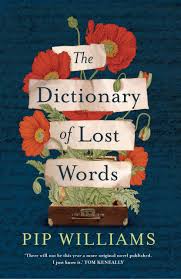




I love that you’ve put Waking Romeo in the classics section, it definitely pays homage to those two novels.
I loved The Dictionary of Lost Words, I’m glad it was short-listed. Great round up.
Thanks Claire. I decided to out it there for a bit of fun… Glad you’re happy with that!
Guilty…The Dictionary of Lost Words is still on my tbr as well!
Glad I’m not the only one Theresa!
It’s still on my TBR too, so add me to the list 😀
Thanks for the shout-outs Sue. I hope you enjoy the On Shirley Hazzard as much as I did.
You can now also add Amanda Lohrey to your award winning list after her Miles Franklin win this afternoon 🙂
Thanks Brona….. And thanks for your reviews. Lohrey will of course be added next month. I knew when I posted this… On the schedule given me that it would be one day before this announcement. Oh well!
Wonderful post and highly deserving authors! Sadly I did not enjoy ‘The Dictionary of Lost Words’ as much as the hype wanted me to.
It has had mixed reactions, Gretchen. My Mum, a lexicographer, loved it. I plan to love it 😄